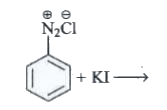Boron can be obtained by various methods but not by :
thermal decomposition of B2H6
pyrolysis of BI3 (van Arkel)
reducing BCl3 with H2
electrolysis of fused BCl3
The correct Answer is:D
To determine which method cannot be used to obtain boron, we will analyze each option provided in the question step by step.
Step 1: Analyze the first method - Thermal Decomposition of B2H6
- Process: B2H6 (diborane) is heated at high temperatures (300-500 °C).
- Reaction:
B2H6→2B+3H2
- Conclusion: This method produces boron. Therefore, this option is not the answer.
Step 2: Analyze the second method - Pyrolysis of Bi3
- Process: Bi3 (boron triiodide) is heated at high temperatures (450 °C).
- Reaction:
2Bi3→2B+3I2
- Conclusion: This method also produces boron. Therefore, this option is not the answer.
Step 3: Analyze the third method - Reducing BCl3 with H2
- Process: BCl3 (boron trichloride) is reduced with hydrogen at high temperatures (800-1000 °C).
- Reaction:
2BCl3+3H2→2B+6HCl
- Conclusion: This method produces boron as well. Therefore, this option is not the answer.
Step 4: Analyze the fourth method - Electrolysis of fused BCl3
- Process: Electrolysis is performed on fused BCl3.
- Conclusion: Electrolysis is generally used for extracting highly electropositive metals (like Na, K, Mg, Ca, Al) and not for boron. Therefore, this method does not yield boron.
Final Answer
Based on the analysis, the method that cannot be used to obtain boron is:
Electrolysis of fused BCl3 (Option D).
---
- Process: B2H6 (diborane) is heated at high temperatures (300-500 °C).
- Reaction:
B2H6→2B+3H2
- Conclusion: This method produces boron. Therefore, this option is not the answer.
- Process: Bi3 (boron triiodide) is heated at high temperatures (450 °C).
- Reaction:
2Bi3→2B+3I2
- Conclusion: This method also produces boron. Therefore, this option is not the answer.
- Process: BCl3 (boron trichloride) is reduced with hydrogen at high temperatures (800-1000 °C).
- Reaction:
2BCl3+3H2→2B+6HCl
- Conclusion: This method produces boron as well. Therefore, this option is not the answer.
- Process: Electrolysis is performed on fused BCl3.
- Conclusion: Electrolysis is generally used for extracting highly electropositive metals (like Na, K, Mg, Ca, Al) and not for boron. Therefore, this method does not yield boron.
Based on the analysis, the method that cannot be used to obtain boron is:
Electrolysis of fused BCl3 (Option D).
Topper's Solved these Questions
- METALLURGYBOOK - VK JAISWAL ENGLISHCHAPTER - METALLURGYEXERCISE - Level 3 (Passive 1)
8 Videos
- METALLURGYBOOK - VK JAISWAL ENGLISHCHAPTER - METALLURGYEXERCISE - Level 3 (Passive 2)
6 Videos
- METALLURGYBOOK - VK JAISWAL ENGLISHCHAPTER - METALLURGYEXERCISE - ASSERTION-REASON TYPE QUESTIONS
29 Videos
- ENVIRONMENTAL CHEMISTRYBOOK - VK JAISWAL ENGLISHCHAPTER - ENVIRONMENTAL CHEMISTRYEXERCISE - ASSERTION-REASON TYPE QUESTIONS
14 Videos
- p-BLOCK ELEMENTSBOOK - VK JAISWAL ENGLISHCHAPTER - p-BLOCK ELEMENTSEXERCISE - SUBJECTIVE PROBLEMS
35 Videos
Similar Questions
Knowledge Check
Benzene can be obtained by :
AC6H5OH+NaOHCuO−−→ΔBC6H5OH+ZnΔCC6H5−N=N−Cl+H2O→DAll of theseIodobenzene can be obtained by :
A B
B C
C D
D
Boron is a
AmetalBnon-metalCsemi-metalDmetalloid
